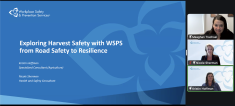Ontario’s tender fruit (peach, plum, apricot, nectarine) industry will get aid and further surveillance from a new federal/provincial venture to eradicate plum pox.
The federal and Ontario governments announced the funding Monday. Agriculture and Agri-Food Canada will put up $36.16 million over four years, and the Canadian Food Inspection Agency $9.44 million, “to continue the high level of detection and surveillance of the disease, and financial assistance to affected producers.”
Ontario’s agriculture ministry is committed to contributing its portion of the 60:40 funding for the asset loss assistance program for the 2007 program year, according to a release.
Read Also

India slaps 30 per cent import duty on yellow peas
India has imposed a 30 per cent duty on yellow pea imports with a bill of lading date on or after Nov. 1, 2025.
First spotted in Ontario and Nova Scotia in 2000, likely arriving through imported material, plum pox (PPV) is a fruit virus that causes significant yield losses in tender fruit and also damages ornamental trees and shrubs. It’s transmitted from infected trees by aphids, or by grafting and budding.
In its early stages, the federal government said, PPV is hard to detect so trees need to be sampled intensively and a few years in a row to find all infected trees.
The disease has been eradicated in Nova Scotia and the only remaining area under quarantine is in the Niagara region. It has never been spotted in other tender fruit-growing provinces such as B.C. or Quebec, the government said.
The disease has no cure and can only be eradicated by removing or destroying infected trees, roots included, by burning and chipping. No chemical treatment is available, the government noted.
Not eradicating PPV would cost the fruit industry $114 million over the next 25 years in lost yield and quality, probable restrictions on border movement, the disease’s likely spread across Canada and about $900,000 per year, indefinitely, for Ottawa to monitor the disease.
“International and Canadian experts have stated it is possible to eradicate PPV if Canada acts quickly,” the government noted, and the current PPV program is based on that advice.
There is no formal recourse process for growers who object to their trees being pulled up and destroyed. The government said they could likely seek court injunctions but courts have generally supported policy decisions on quarantine pests.











